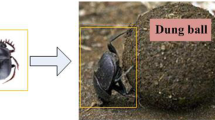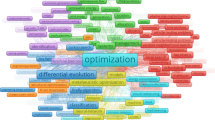Abstract
There are two problems in Collaborative optimization (CO): (1) the local optima arising from the selection of an inappropriate initial point; (2) the low efficiency and accuracy root in inappropriate relaxation factors. To solve these problems, we first develop the Latin hypercube design (LHD) to determine an initial point of optimization, and then use the non-linear programming by quadratic Lagrangian (NLPQL) to search for the global solution. The effectiveness of the initial point selection strategy is verified by three benchmark functions with some dimensions and different complexities. Then we propose the Adaptive relaxation collaborative optimization (ARCO) algorithm to solve the inconsistency between the system level and the disciplines level, and in this method, the relaxation factors are determined according to the three separated stages of CO respectively. The performance of the ARCO algorithm is compared with the standard collaborative algorithm and the constant relaxation collaborative algorithm with a typical numerical example, which indicates that the ARCO algorithm is more efficient and accurate. Finally, we propose a Hybrid collaborative optimization (HCO) approach, which integrates the selection strategy of initial point with the ARCO algorithm. The results show that HCO can achieve the global optimal solution without the initial value and it also has advantages in convergence, accuracy and robustness. Therefore, the proposed HCO approach can solve the CO problems with applications in the spindle and the speed reducer.
Similar content being viewed by others
References
I. Kroo, S. Altus, R. Braun, P. Gage and I. Sobieski, Multidisciplinary optimization methods for aircraft preliminary design, 5th AIAA/NASA/USAF/ISSMO Symposium on Multidisciplinary Analysis and Optimization, Panama City, Florida, USA (1994) 697–707.
R. Balling and M. R. Rawlings, Collaborative optimization with disciplinary conceptual design, Structural and Multidisciplinary Optimization, 20 (3) (2000) 232–241.
D. W. Olivier, A. Jeremy and J. Sobieszczanski-Sobieski, State-of-the-art and future trends in multidisciplinary design optimization, 48th AIAA/ASME/ASCE/AHS/ASC Structures, Structural Dynamics, and Materials Conference, Waikiki (2007) 2467–2487.
R. Braun, P. Gage, I. Kroo and I. Sobieski, Implementation and performance issues in collaborative optimization, 6th AIAA/NASA/ISSMO Symposium on Multidisciplinary Analysis and Optimization, Bellevue, WA, USA (1996) 295–305.
N. M. Alexandrov and R. M. Lewis, Analytical and computational properties of distributed approaches to MDO, 8th Symposium on Multidisciplinary Analysis and Optimization, Long Beach, USA (2000) 1–12.
A.V. DeMiguel and W. Murray, An analysis of collaborative optimization methods, 8th Symposium on Multidisciplinary Analysis and Optimization, Long Beach, USA (2000) 1–13.
I. P. Sobieski and I. M. Kroo, Collaborative optimization using response surface estimation, AIAA J., 38 (10) (2000) 1931–1938.
M. Zhao and W. C. Cui, On the development of Bi-level integrated system collaborative optimization, Structural and Multidisciplinary Optimization, 43 (1) (2011) 73–84.
W. W. Hu, S. Azarm and A. Almansoori, New approximation assisted multi-objective collaborative robust optimization (new AA-McRO) under interval uncertainty, Structural and Multidisciplinary Optimization, 47 (1) (2013) 19–35.
Y.-H. Jeon, S. Jun, S. Kang and D.-H. Lee, Systematic design space exploration and rearrangement of the MDO problem by using probabilistic methodology, JMST, 26 (9) (2012) 2825–2836.
H. Z. Huang, Y. Tao and Y. Liu, Multidisciplinary collaborative optimization using fuzzy satisfaction degree and fuzzy sufficiency degree model, Soft Computing, 12 (10) (2008) 995–1005.
B.-S. Jang, Y.-S. Yang, H.-S. Jung and Y.-S. Yeun, Managing approximation models in collaborative optimization, Structural and Multidisciplinary Optimization, 30 (1) (2005) 11–26.
A. O. Stanley and P. Hajela, Genetic algorithm based collaborative optimization of a tilt rotor configuration, 46th AIAA/ASME/ASCE/AHS/ASC Structures, Structural Dynamics and Materials Conference, Austin, Texas, USA (2005) 1–12.
S. Lee, D.-H. Lee, K.-H. Kim, T. C. Park, B. J. Lim and Y.-S. Kang, Multi-disciplinary design optimization and performance evaluation of a single stage transonic axial compressor, JMST, 27 (11) (2013) 3309–3318.
Y. Q. Song and B. K. Xia, Particle swarm collaborative optimization algorithm based on velocity angle, J. of Computer Applications, 27 (11) (2007) 2824–2825.
B. D. Roth and I. M. Kroo, Enhanced collaborative optimization: A decomposition-based method for multidisciplinary design, ASME International Design Engineering Technical Conferences/Computers and Information in Engineering Conference, New York, USA (2008) 1–10.
M. Xiao, H. B. Qiu, L. Gao, X. Y. Shao and X. Z. Chu, An enhanced collaborative optimization methodology for multidisciplinary design optimization, 2010 International Conference on Mechanical, Industrial, and Manufacturing Technologies, Sanya, China (2010) 275–280.
P. M. Zadeh, J. Roshanian and M. R. Farmani, Particle swarm optimization for multi-objective collaborative multidisciplinary design optimization, American Institute of Aeronautics and Astronautics Inc., Orlando, FL, United States (2010).
P. Hajela, Soft computing in multidisciplinary aerospace design-new directions for research, Progress in Aerospace Sciences, 38 (1) (2002) 10–31.
X. P. Du and W. Chen, Collaborative reliability analysis under the framework of multidisciplinary systems design, Optimization and Engineering, 6 (1) (2005) 63–84.
N. M. Alexandro and R. M. Lewis, Analytical and computational aspects of collaborative optimization for multidisciplinary design, AIAA J., 40 (2) (2002) 301–309.
K.-S. Jeon, J.-W. Lee and J.-H. Choi, Efficient system optimization techniques through subspace decomposition and response surface refinement, AIAA Paper, AIAA-2002-0321 (2002).
X. Li, W. J. Li and C. A. Liu, Geometric analysis of collaborative optimization, Structural and Multidisciplinary Optimization, 35 (4) (2008) 301–313.
H. Y. Li, M. X. Ma, Y. W. Jin and R. Lliu, Improved multidisciplinary collaborative optimization with global stability, Computer Integrated Manufacturing Systems, 15 (12) (2009) 2363–2369 (in Chinese).
J. B. Guo and S. K. Zeng, Research on adaptive collaborative optimization method, System Engineering and Electronics, 31 (5) (2009) 1108–1112 (in Chinese).
A. Ratnaweera, S. K. Halgamuge and H. C. Watson, Selforganizing hierarchical particle swarm optimizer with timevarying acceleration coefficients, IEEE Transaction on Evolutionary Computation, 8 (3) (2004) 240–255.
W. Y. Gong, Z. H. Cai and X. Charles, DE/BBO: A hybrid differential evolution with biogeography-based optimization for global numerical optimization, Soft Computing, 15 (4) (2010) 645–665.
X. Yao, Y. Liu and G. Lin, Evolutionary programming made faster, IEEE Transaction on Evolutionary Computation, 3 (2) (1999) 82–102.
Geatbx, Example Functions (Single and multi-objective functions) 2 Parametric Optimization, http://www.geatbx.com/docu/fcnindex-01.html.
R. S. Sellar, S. M. Batill and J. E. Renaud, Response surface based concurrent subspace optimization for multidisciplinary system design, AIAA Paper, AIAA-1996-0714 (1996).
C. G. Guo, P. J. Wang and P. Tian, Optimization design of CNC machine tool spindle based on genetic algorithm, J. of Northeastern University (Natural Science), 32 (6) (2011) 850–853 (in Chinese).
D. W. Li, W. X. Deng, H. L. Gao, M. H. Xu and S. Chen, Study on parameters optimization in numerical machining of stainless steel based on MATLAB, 4th International Conference on Genetic and Evolutionary Computing, Shenzhen, China (2010) 329–332.
W. X. Li, Engineering optimization design with MATLAB, Tsinghua University Press, Beijing, China (2010) (in Chinese).
K. Srinivas, Evaluation of methods for multidisciplinary design optimization (MDO), Phase I, NASA/CR-1998-208716 (1998).
Author information
Authors and Affiliations
Corresponding author
Additional information
Recommended by Editor Haedo Jeong
Aimin Ji is a professor of the College of Mechanical and Electrical Engineering, Hohai University, China. His research interests include digital design and manufacturing, CAD/CAE integration, multidisciplinary design optimization, etc.
Xu Yin received his M.S. in the College of Mechanical & Electrical Engineering at Hohai University, China. His main research interests include collaborative optimization and intelligent algorithms.
Rights and permissions
About this article
Cite this article
Ji, A., Yin, X. & Yuan, M. Hybrid collaborative optimization based on selection strategy of initial point and adaptive relaxation. J Mech Sci Technol 29, 3841–3854 (2015). https://doi.org/10.1007/s12206-015-0830-6
Received:
Revised:
Accepted:
Published:
Issue Date:
DOI: https://doi.org/10.1007/s12206-015-0830-6




